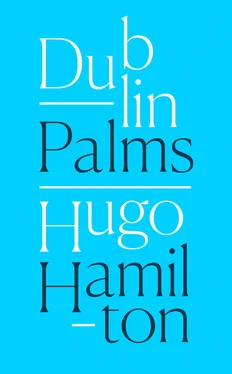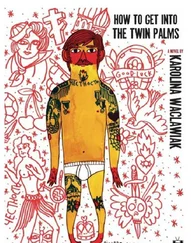There is a man in the town who falls in love with two sisters, she told me. The sisters live in a house on the market square, he is studying to become a lawyer, he calls to the door to collect them both and they go cycling in the country. The three of them cycling through the flat landscape. The wind in the fields is like a comb through green hair. They come to a lake and go swimming, their bodies turn gold, they spend time lying on the grass together. He watches them getting dressed, he admires them both equally, their feet, he wants to understand the mechanism in their ankles, how does all that work?
He cannot make up his mind which of them he should marry and says – if only I could marry you both.
The sisters smile their best. They all cycle back to the town and go to the cinema together. On the market square, there is more trouble, a crowd has gathered to say the cinema cannot be used by people who are Jewish. They leave. He walks them back to their house, he carries on alone through the church grounds, past the house with the fountain in the basement where Thomas à Kempis lived. On his way home, one of the sisters he is in love with comes running after him, she kisses him wildly on the street, she pulls him into a run, out along the streets through the town gates to the windmill, they disappear inside, their faces in the dark.
They hear glass breaking.
The town is full of unrest. The fire brigade is on the way to make sure the fire does not spread. There is smoke all over the market square when they get back. The following day, the student lawyer meets both sisters together and takes them to a café in Krefeld. Goods have been thrown out of the shops into the street. In the café, people make grunting noises, tapping on their cups with their spoons until a Jewish family with three children at one of the tables is forced to leave. He takes the two sisters out, leaving the cakes half finished behind them, he holds them by the hand, one on either side. They go to the opera and afterwards they sit over a drink in the foyer. He tells them that he has made up his mind, it’s only right for him to marry the older sister, the younger sister who brought him to the windmill bursts into tears and runs away into the street.
The windmill in my mother’s town has been disused for many years. It is situated right outside the medieval stronghold and the fortress wall. When my mother was born, the town was occupied by French and Belgian troops stationed in the fortress. Then it was taken over by the Nazis. Then it was taken over by the American forces stationed there after the war.
The student lawyer continues meeting the younger of the sisters at the windmill every night. He loves her, but the protocol of families forces him to marry the older sister first, the younger sister cannot jump the queue. The preparations go ahead, permissions in place, his happiness is in the windmill but his future calls, he cannot delay, the war is coming. The younger sister is left behind in grief at the windmill, watching him walk away, back to the town through the entrance gate with the dawn arriving onto the cobbled streets and the roof of the church a bright pink. Glass crunching underfoot.
In the morning, the younger sister goes to the registry office, calling up documents which have nothing to do with her but with the student lawyer she loves and cannot have. She sits in the office, reading the dates, his entry into life, his mother, his father, his family going back in time. From the documents, the people of the town appear to be scattering, the arrow of time in reverse, uncoupling, unmarrying, dead people coming back to life, children disappearing, families thinning out to the point of arrival, when they first merged into the town.
Tears enter the records. A jealous smudge of vandalism. The letter J is found attached to the family name. The wedding never goes ahead, the names are never joined. The law student disappears. Two sisters left broken hearted, the windmill never moved.
The garden at home had become terribly overgrown since my father died. My mother asked me to do something about it, make a start, at least. She loved the sound of the soil being turned. I brought out a chair, she sat sheltered from the breeze, by the greenhouse.
What I liked about digging was that it had no meaning. I was happy doing something with no great purpose. It was like reverting to childhood, taking over what my father used to do. It was good to have Rosie and Essie there with me. They had their own patch of ground each to work on. They gave me the feeling that I could pass everything on to them, no need for me to achieve anything more.
My life is limited to the vision of a father. My ideas are all designed around them. I love placing things into their minds and watching them bounce back in their crooked words. My success comes through them, I am at their disposal, I love hearing them laugh, my despair returns every time they fight. When Rosie is angry she shouts the word – anything. When Essie is angry she shouts the word – blood.
It was not long before the spade clacked against a solid object. The sound of metal travelled up through the wood into my hands like a tuning fork. It took a while to dig up. It turned out to be an old pair of shears. They were rusted solid. The blades were fused together and could not be prised apart. The wooden handles had completely rotted off, leaving only two core metal prongs. The prongs had been moulded with a twist in the metal, presumably to prevent the handles from slipping. A flat metal cap had been welded on to the top of each prong.
The girls came over to see what I found. With the wooden handles gone, it looked like a set of antlers. My mother laughed. Antlers, she agreed. She called me a poacher. What I’d recovered was a piece of gardening equipment belonging to my father. The fact that the handles had completely rotted away seemed to date them back to when he first bought the house. The garden was a wilderness when my mother arrived from Germany. My father was too embarrassed to take it on. He felt the eyes of the neighbours looking at him through the windows. She didn’t care who was watching and went out to dig the garden herself, while he looked on from the window along with the other neighbours. It was only when he saw her digging the weeds unbothered by the audience that he changed his mind. She freed him from the fear of being judged. He no longer cared about being seen and took over the work himself, growing vegetables in neat rows, a section for flowers, new fruit trees, a patch of lawn and a place to sit in the sun.
His garden fire is what I remember most, the smoke drifting over the boundary walls, sending a message across the world, the neighbours could hardly see a thing, they had to close their windows, it drifted through the house, it was in all the rooms, in our clothes, in our beds, it went out onto the street, the big cigar cloud of his gathered weeds smoking through the afternoon, into the night, still smouldering in the morning.
Helen arrived as soon as her yoga class was finished. My sisters ran to open the front door and let her in. She was like a visitor from another world. They examined every inch, the black beret, her long dark copper hair, the black corduroy jeans, her light green jumper finished off square across the front. Her freckled shoulder came leaping out as she leaned forward to put down her bag on the floor in the hallway. In the kitchen, she spoke in German, remembering words she had learned in Berlin, testing them out on my mother with a contorted twist in her voice. My mother laughed and treated her like a child, slapping her on the thigh – you are a mouse.
It’s a time of revolution. Every act contains some degree of rebellion and disobedience. There is a feeling that things are changing, civil rights, women’s rights. The art scene is full of naked bodies. Things have become less sacred, less respected. Irrelevant things are being brought centre stage, a strange truth is discovered inside objects which have previously been merely functional.
Читать дальше












